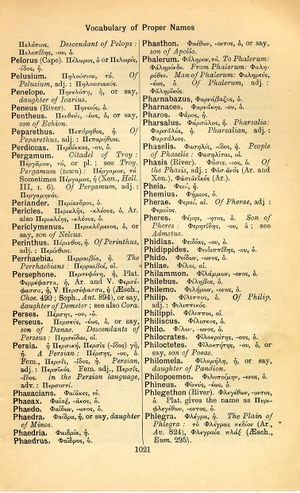Philemo: Difference between revisions
From LSJ
Οὐκ ἔστι σιγᾶν αἰσχρόν, ἀλλ' εἰκῆ λαλεῖν → Silere non est turpe, sed frustra loqui → nicht Schweigen schändet, sondern Schwätzen auf gut Glück
(D_7) |
(Gf-D_7) |
||
| Line 1: | Line 1: | ||
{{WoodhouseENELnames | {{WoodhouseENELnames | ||
|Text=[[File:woodhouse_1021.jpg|thumb|link= | |Text=[[File:woodhouse_1021.jpg|thumb | ||
|link={{filepath:woodhouse_1021.jpg}}]]Φιλήμων, -ονος, ὁ. | |||
}} | }} | ||
{{Lewis | {{Lewis | ||
Revision as of 07:44, 14 August 2017
English > Greek (Woodhouse)
Φιλήμων, -ονος, ὁ.
Latin > English (Lewis & Short)
Phĭlēmo: or -on, ŏnis, m., = Φιλήμων.
I A Greek comic poet, a native of Soli, in Cilicia, and a contemporary of Menander, Plaut. Trin. prol. 10; cf. Quint. 10, 1, 72; Gell. 17, 4, 1; App. Flor. 3, p. 353.—
II An historian, Plin. 4, 13, 27, § 95.—
III In mythology, a pious rustic, the husband of Baucis, Ov M. 8, 631 sq.
Latin > French (Gaffiot 2016)
Phĭlēmō (-mōn), ōnis, m. (Φιλήμων),
1 Philémon [mari de Baucis : Ov. M. 8, 631
2 poète grec de la nouvelle comédie : Pl. Trin. 10 ; Quint. 10, 1, 72
3 nom d’un historien du temps d’Auguste : Plin. 4, 95.

